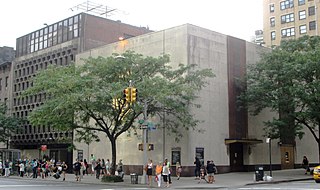
Reform Judaism, also known as Liberal Judaism or Progressive Judaism, is a major Jewish denomination that emphasizes the evolving nature of Judaism, the superiority of its ethical aspects to its ceremonial ones, and belief in a continuous revelation which is closely intertwined with human reason and not limited to the Theophany at Mount Sinai. A highly liberal strand of Judaism, it is characterized by little stress on ritual and personal observance, regarding Jewish law as non-binding and the individual Jew as autonomous, and by a great openness to external influences and progressive values.
The Union for Reform Judaism (URJ), formerly known as the Union of American Hebrew Congregations (UAHC) until 2003, founded in 1873 by Rabbi Isaac Mayer Wise, is the congregational arm of Reform Judaism in North America. The other two arms established by Rabbi Wise are the Hebrew Union College-Jewish Institute of Religion and the Central Conference of American Rabbis. The current president of the URJ is Rabbi Rick Jacobs.

The Hebrew Union College – Jewish Institute of Religion is a Jewish seminary with three locations in the United States and one location in Jerusalem. It is the oldest extant Jewish seminary in the Americas and the main seminary for training rabbis, cantors, educators and communal workers in Reform Judaism. HUC-JIR has campuses in Cincinnati, Ohio, New York City, Los Angeles, and Jerusalem. The Jerusalem campus is the only seminary in Israel for training Reform Jewish clergy.
The Jewish Institute of Religion was an educational establishment created by Rabbi Stephen S. Wise in 1922 in New York City. While generally incorporating Reform Judaism, it was separate from the previously established Hebrew Union College. It sought to train rabbis "for the Jewish ministry, research, and community service." Students were to serve either Reform or traditional pulpits.

The history of the Jews in Cincinnati occupies a prominent place in the development of Jewish secular and religious life in the United States. Cincinnati is not only the oldest Jewish community west of the Allegheny Mountains but has also been an institutional center of American Reform Judaism for more than a century. The Israelite, the oldest American Jewish newspaper still (2019) being published, began publication in Cincinnati in 1854.

Congregation Beth Elohim, also known as the Garfield Temple and the Eighth Avenue Temple, is a Reform Jewish congregation and historic synagogue located at 274 Garfield Place and Eighth Avenue, in the Park Slope neighborhood of Brooklyn in New York City, New York, United States.

Milken Community School is a private Jewish high school and middle school. It is located on Mulholland Drive in the Bel Air area of Los Angeles, California. It is one of the largest Jewish day schools in the United States. Long affiliated with Stephen S. Wise Temple, a Reform congregation, the school is officially non-denominational, and became independent from the temple in July 2012. Despite the separation, Milken Community Schools continues to be the school in which many Stephen S. Wise students are enrolled.
Balfour Brickner, a leading rabbi in the Reform Judaism movement, was rabbi emeritus of the Stephen Wise Free Synagogue in Manhattan when he died.
Alexander Moshe Schindler was a rabbi and the leading figure of American Jewry and Reform Judaism during the 1970s and 1980s. One of the last European-born leaders of American Reform Jewry, he served as president of the Union of American Hebrew Congregations (UAHC) for 23 years.

The Wilshire Boulevard Temple, known from 1862 to 1933 as Congregation B'nai B'rith, is a Reform Jewish congregation and synagogue, located at 3663 Wilshire Boulevard, in the Wilshire Center district of Los Angeles, California, in the United States. Founded in 1862, it is the oldest Jewish congregation in Los Angeles.
The first openly lesbian, gay, bisexual, and transgender clergy in Judaism were ordained as rabbis and/or cantors in the second half of the 20th century.

Temple Israel is a Reform Jewish congregation and synagogue, located at 130 Riverside Drive in Dayton, Ohio, in the United States.

Temple Shaaray Tefila is a Reform Jewish synagogue located at 250 East 79th Street on the Upper East Side of Manhattan in New York City, New York, United States.

Temple Emanuel is a Reform Jewish congregation and synagogue, located at 300 North Clark Drive, in Beverly Hills, California, in the United States.

Reform Congregation Keneseth Israel, abbreviated as KI, is a Reform Jewish congregation and synagogue located at 8339 Old York Road, Elkins Park, just outside the city of Philadelphia, Pennsylvania, in the United States. Founded in Philadelphia in 1847, it is the sixth oldest Reform congregation in the United States, and, by 1900, it was one of the largest Reform congregations in the United States. The synagogue was at a number of locations in the city before building a large structure on North Broad Street in 1891, until 1956 when it moved north of the city to suburban Elkins Park.
Temple Israel is a Reform synagogue, located in Ottawa, Ontario, Canada. The synagogues home to the second largest congregation in Ottawa, with approximately 340 families, and has a supplementary religious school.
Maurice Nathan Eisendrath was a leader of American Reform Judaism, the head of the Union of American Hebrew Congregations from 1943 until his death, an author, and an activist, particularly active in the U.S. Anti-war Movement of the 1960s. The Maurice N. Eisendrath Bearer of Light Award, one of the highest honors bestowed by the American Reform Movement, is named in his honor.

Isaiah Zeldin was an American rabbi. He was the founder of the Stephen S. Wise Temple, a Reform synagogue in Bel Air, Los Angeles, California.
George Zepin was a Ukrainian-born American rabbi and administrator of the Union of American Hebrew Congregations.
Abraham Jehiel Feldman was a Ukrainian-born American rabbi.











